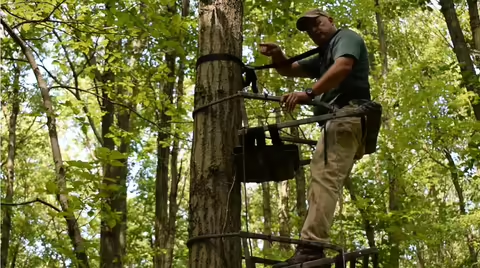URBANA, Ill. – With archery season opening Oct. 1, deer hunters will soon start heading to the woods.
Tree stand falls are one of the most common hunting injuries that can be prevented with some simple safety measures such as always wearing a harness and choosing a sturdy tree.
“Shortcuts lead to accidents, and there’s not a deer out there that’s worth falling 15 feet to the ground,” says Curt Sinclair, University of Illinois Extension 4-H natural resources and shooting sports specialist.
From 2015 to 2019, 90% of all non-firearm or bow accidents happened when a hunter fell from an elevated tree stand, according to the Illinois Department of Natural Resources.
Sinclair has taught hunter safety for 30 years and leads the Illinois 4-H Shooting Sports program, which includes a hunting and outdoor skills curriculum for youth that emphasizes safety and responsibility.
Deer hunters use stands, usually attached 10 to 18 feet up a tree, for a variety of reasons. The elevated position allows a clear line of sight over brush and the angle of projectiles is directed toward the ground.
“There’s a lot of advantages to being above the ground, but the biggest disadvantage is you can fall,” Sinclair says. “Being up in a tree is one of the most dangerous parts of deer hunting which is why you can’t learn too much.”
Hunters should pick a tree that is sturdy and straight with no obvious signs of disease or damage such hanging limbs that could fall. Oak trees with a trunk 8 to 16 inches in diameter are a good option.
Tree stands are most dangerous during the installation and take down.
“Whenever you are off the ground, even if it’s 1 foot, you need to wear a safety harness that is attached to the tree,” Sinclair says. “If you don’t have a harness on and you’re using both hands to work on something, you’re in a dangerous situation.”
Tree stand safety tips:
- Leave enough time, do not install a stand the day you plan to hunt
- Select a sturdy, straight tree with a trunk 8-16 inches in diameter
- Always wear a safety harness
- Have a partner
- Use a haul line to pull up gear instead of climbing with it
To help hunters, Sinclair demonstrates how to safely install a ladder stand, a hang on stand or a climbing stand in a series of videos available on YouTube at go.illinois.edu/TreeStandVideos.
SOURCE: Curt Sinclair, 4-H Specialist, Natural Resources and Shooting Sports, Illinois Extension
WRITER: Emily Steele, Media Communications Coordinator, Illinois Extension
ABOUT EXTENSION: Illinois Extension leads public outreach for University of Illinois by translating research into action plans that allow Illinois families, businesses, and community leaders to solve problems, make informed decisions, and adapt to changes and opportunities.
